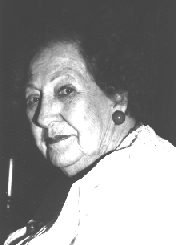Page 44
[Begin Tape 1, Side A]
Knight: Last time we talked, you had entered the WACs, and we talked a little bit about your work with the WACs. I wanted to continue to talk about that. You said that you were assigned to the Surgeon General's Office.
McClendon: I was the first WAC on orders. There was another WAC over there, but she didn't have any orders. She was over there helping as a physical therapist, but she didn't have any orders. So I was the first formally put there.
Knight: What kind of stories did you cover?
McClendon: Oh, it was fascinating. Absolutely fascinating. I loved it. You see, we had all the army surgeons in the field throughout the world. The army had to make reports, and they wrote in about the operations and about what happened, what they were trying to do and how they did it. Many of their papers were used as examples to tell other surgeons. They were screened in our office by Dr. [Michael Ellis] DeBakey, a noted man now in Houston [Texas]. They were screened by him and others, and they would put out bulletins for the other surgeons in the field to read, giving examples of their experiences and what they'd done under pressure and that sort of thing.
Then the first time I ever heard of penicillin, we had obtained some. A private family wrote in to try to get some, and we started using penicillin for soldiers, we started using sulfa drugs for soldiers for the first time while I was there.
I dealt a lot with the publications for the American Medical Association. They had to clear everything with us. And I dealt with newspaper people, my friends, who later became my colleagues in the press corps in Washington. Esther Tufty and different ones would come by there to get news stories, and I would help them get them, as far as I could.
Our job was to help any reporter who came by. Lots of people came by from Medical Press and from Office of War Information. One woman wrote in from Africa, was a mess officer, and wanted permission to serve in the mess hall, as a food, a native little animal that was popular with the native people. Some of the soldiers had eaten it and liked it, and she wanted permission to serve this. I'd give anything if I had kept the letter and had it now, to know what kind of animal it was. I'd just love to have that story; it was a good story. All these things came under the heading of what had to be looked at by the army surgeon general.
Then I worked under a very noted man named Munro Leaf, who had put out the book called The Brave Bull. He dealt with a man out in El Paso named Tom Lea, who was noted for his drawings of bulls. Munro Leaf put out books for, I think, children. He was an interesting officer, a young fellow, a very nice man. Then I worked with several interesting nurses. The Nurse Corps was, of course, under the surgeon general. We had to supervise anything that they put out.
My best assignment of all in my whole life, I think, was being told that the army had decided as a policy that it was going to try to prepare the people of the country for the return of the wounded and maimed and the burned, the blind, the deaf, the men with amputations, and maybe the men who were mentally ruined. So to do that, they sent me to some hospitals up in Pennsylvania, where they were already working on burn cases. They did tremendous things with

